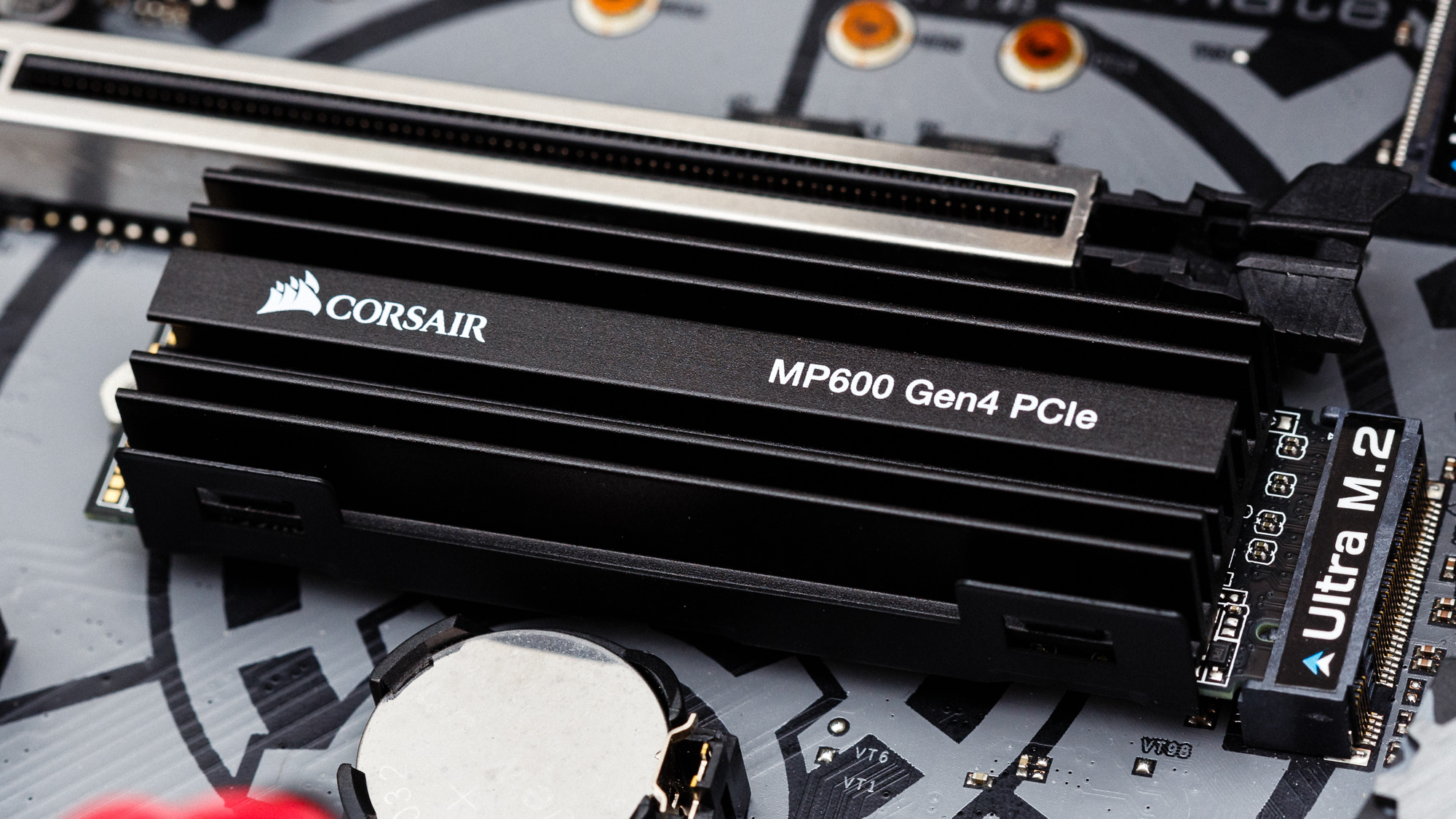Why you can trust Tom's Hardware
The PCIe 4.0 interface opens up new potential for SSDs to hit record-setting speeds with twice as much available bandwidth, upwards of 7-8 GBps with an x4 link. That said, because of the haste to keep up with AMD’s launch, current models are not that fast quite yet, but you can still get a taste of some of that massive bandwidth now.
Phison is the first manufacturer on the market to offer a consumer-oriented PCIe 4.0 NVMe controller. Back in June, we were able to take an early look at an engineering sample of Phison’s new E16. But in that article, we used an Intel platform with a very expensive adapter to preview the performance of these new PCIe 4.0 SSDs offer. Now, we finally have AMD hardware and finalized samples, and we are able to see the performance more accurately.

So is the extra performance worth the price? That's up to your and your specific workflow. If sequential performance is key to what you do, then the answer is a resounding yes, though if you want even more performance, you may want to wait for a newer controller that gets you closer to PCIe 4.0's maximum bandwidth.
There are a few options out there if you want to deck out your new AMD system with some PCIe 4.0 SSD goodness. If you’re a fan of Corsair, the company’s Force MP600 is one heck of a drive. Like other current-gen PCIe 4.0 NVMe SSDs, it is based on the same components, a Phison E16 plus some Kioxia BiCS4 96L TLC flash.
In testing, it proved itself as a top-end contender by dominating most other NVMe SSDs with its incredible 5,000/4,250 MBps throughput. Consistently, it was at the top of the leaderboards, trading blows with Samsung’s 970 PRO and Intel’s Optane 905P. Of course, Intel’s luxury Optane storage helps it significantly at low QDs, which boosted application results. But it was bested in throughput potential, bottlenecked by its controller and interface, unlike the MP600.
But, overall, the difference between the Corsair Force MP600 and most other NVMe SSDs isn’t near as much as the difference between an HDD to an SSD, and even less than that between a SATA SSD to an NVMe one.
So, if you are looking to build a value-based gaming system, fancy, high-speed NVMe SSDs are overkill; plain old SATA is more than enough. Even if you're building a mid-range system, PCIe 3.0 x4 NVMe SSDs typically more than enough performance.
Get Tom's Hardware's best news and in-depth reviews, straight to your inbox.
But, if you can truly take advantage of the extra sustained speed or you just want a crazy fast drive to go with your new X570 rig, the MP600 is well worth considering. Plus, at its current pricing, which is cheaper than the Samsung 970 Series, it also could be considered a good value -- but again, only if your workflow benefits from high sequential reads and writes and the high endurance ratings of this drive.
MORE: Best SSDs
MORE: How We Test HDDs And SSDs
MORE: All SSD Content

Sean is a Contributing Editor at Tom’s Hardware US, covering storage hardware.
-
dan_L I'm kind of wondering why the article didn't include the most comparable NVMe drive, the Gigabyte Aorus? It would seem to make sense to see how the two compare.Reply
I got the 1 TB Aorus a few weeks ago and it does, indeed, top 5,000 MBps sequential reads and close to 5,000 for sequential writes (using CrystalMark). I can report that this speed definitely makes one's computer a lot peppier than, say, the Samsung 970 EVO it replaced, espepcially when doing intensive desktop publishing and copying files of just about any size. The price of the Aorus does come down to $210 at Micro Center and newegg.com from time to time. -
seanwebster Reply
I do not have access to one. Besides, its the same exact drive with a different heatsink. The performance is the same.dan_L said:I'm kind of wondering why the article didn't include the most comparable NVMe drive, the Gigabyte Aorus? It would seem to make sense to see how the two compare.
I got the 1 TB Aorus a few weeks ago and it does, indeed, top 5,000 MBps sequential reads and close to 5,000 for sequential writes (using CrystalMark). I can report that this speed definitely makes one's computer a lot peppier than, say, the Samsung 970 EVO it replaced, espepcially when doing intensive desktop publishing and copying files of just about any size. The price of the Aorus does come down to $210 at Micro Center and newegg.com from time to time. -
mrnelson Since we’re all so interested in NVMe speeds with Ryzen 3000, could you publish a few benchmarks with these drives running in a dual RAID 0 configuration? I‘m really curious how AMD’s implementation performs as I’m only familiar with Intel’s RST (this is in light of so many X570 motherboards having at least two M.2 slots).Reply
Given the disparate pricing/sizing/performance of available NVMe drives, there may be low price performance sweet spots going two smaller/cheaper drives in RAID 0, no? -
supremelaw Is Intel planning to make Optane drives that also use PCIe 4.0 bandwidth?Reply
I like the idea of "syncing" chipset speeds with drive interface speeds.
Storage manufacturers should be embracing PCIe 4.0 with more options.
And, NVMe should support all modern RAID modes, in the same way
that integrated SATA ports eventually came with "native" RAID support.
EDIT: just saw this review:
https://www.tomshardware.com/news/lexars-new-nvme-ssd-hits-7gbps-the-fastest-yet-for-a-pcie-40-ssd -
pdegan2814 I ended up getting one of these drives for my most recent PC build, a Ryzen 3xxx system. The performance is definitely there but what sold me was the endurance rating. Honestly, a simple SATA ssd is probably "enough" performance for my needs, what I want is a drive that'll last.Reply